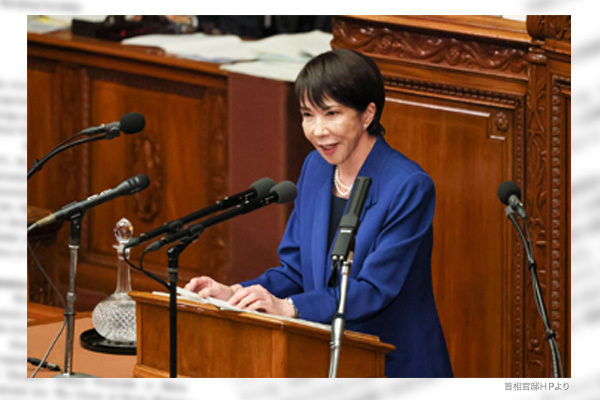At the House of Representatives Budget Committee on November 7, representatives from the opposition Constitutional Democratic Party of Japan, including former Foreign Minister Katsuya Okada, repeatedly posed questions to Prime Minister Sanae Takaichi that suggested Japan might initiate a war. As a result, China overreacted, leading to increased bilateral diplomatic tensions. Responsible for the situation was not the prime minister who answered questions, but the CDP lawmakers who asked provocative questions.
Natural declaration of intent to defend Japan
As Okada asked Takaichi what survival-threatening situations would be, the prime minister answered, “If a situation is accompanied by the use of force using battleships, for instance, it can obviously be survival-threatening.” This is a very natural explanation within the scope stipulated in the Peace and Security Legislation.
Later, Hiroshi Ogushi, another CDP representative, took issue with the remark, asking Takaichi to withdraw or cancel it. Takaichi made clear that she had no intention of withdrawing or canceling it. This is also a natural response.
Deterrence works only when a country sends its opponent a clear message that it has the will and ability to fight in an emergency. Takaichi’s remark cited a concrete case in which a survival-threatening situation could be recognized, clarifying Japan’s will to stand up for its own defense together with the United States. That China later demonstrated an unusually hardline response to the remark can itself be seen as evidence that deterrence is working.
Opposition’s perception of security undermines national interests
Behind Takaichi's unprecedentedly specific answer is the reality that the possibility of a Taiwan contingency has increased more than ever as the Chinese military has repeatedly conducted exercises that closely resemble an actual war. Although Okada insisted that none should talk about a Taiwan contingency lightly, Takaichi, who is responsible for the national survival as prime minister, has a duty to seriously talk about a Taiwan contingency that cannot be separated from a Japan contingency.
Nevertheless, the CDP lawmakers showed a lack of understanding regarding the harsh security environment surrounding Japan. Such a failure is disgraceful for members of the National Diet. If they understood the situation and aimed to fabricate the impression that the prime minister was about to start a war, their act should have seriously undermined Japan’s national interests and should be subjected to a strict verdict by voters.
In response to the Takaichi remark, China’s Consul General in Osaka, Xue Jian, posted a social media message that he would cut off her filthy neck without hesitation. This is an abusive statement that can never be forgiven for a diplomat. The Japanese government should demand him to promptly leave the country as a persona non grata.
What is important for Japan is to continuously communicate to the rest of the world its strong determination to resolutely defend itself, as demonstrated by the Takaichi government, and steadily promote its defense buildup, without succumbing to such external pressure. That is the only realistic way to forestall a war and maintain regional stability.
Kiyofumi Iwata is a member of the Planning Committee at the Japan Institute for National Fundamentals. Formerly, he served as Chief of Staff of the Japan Ground Self-Defense Force.


